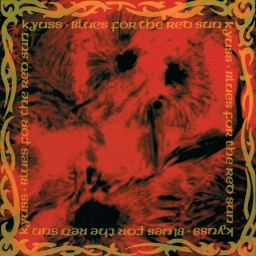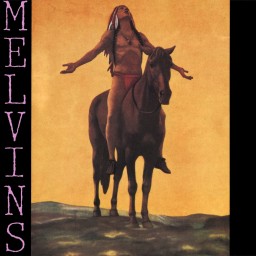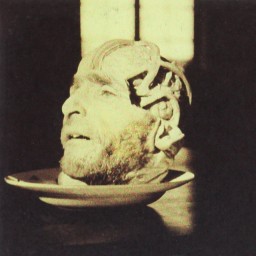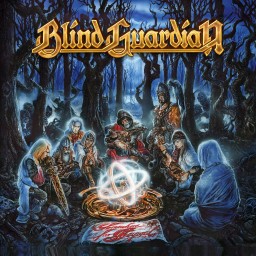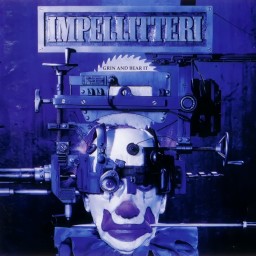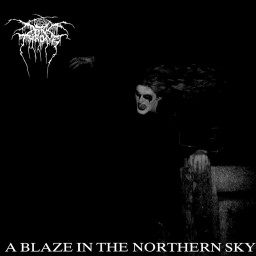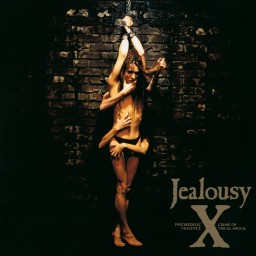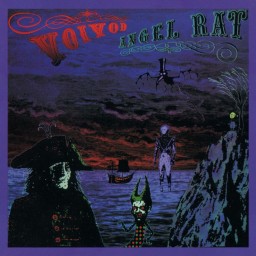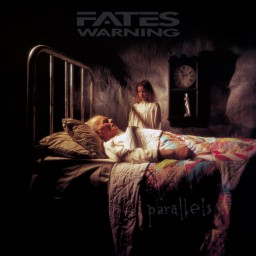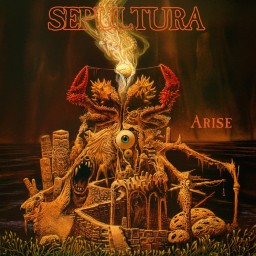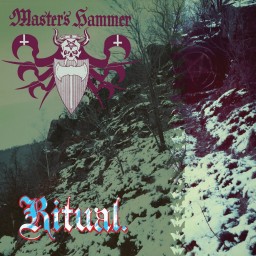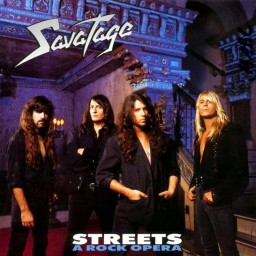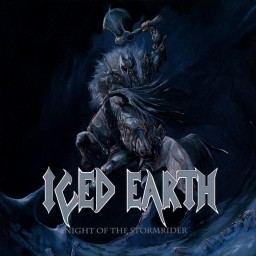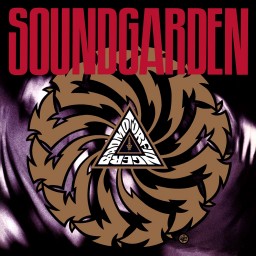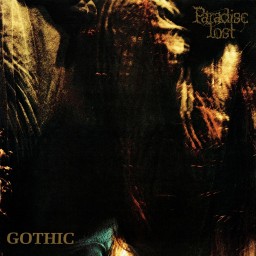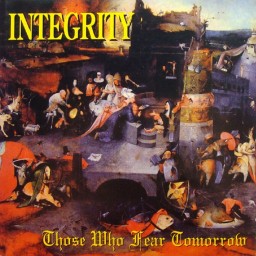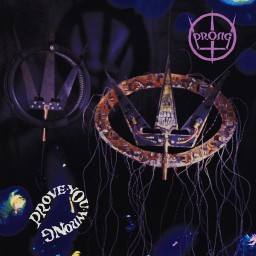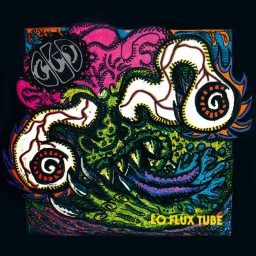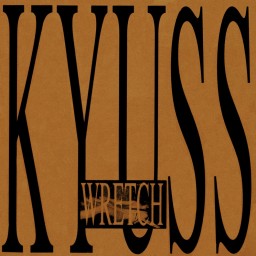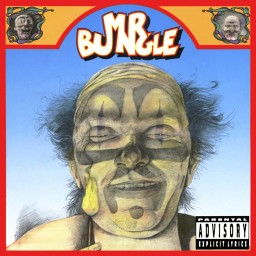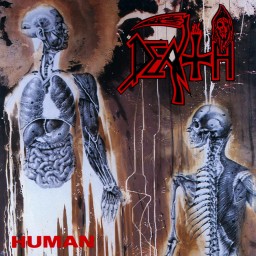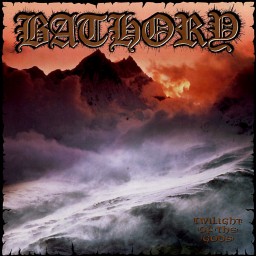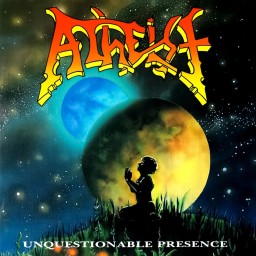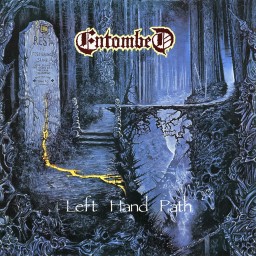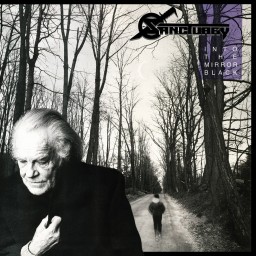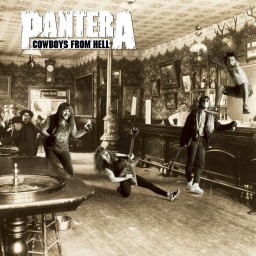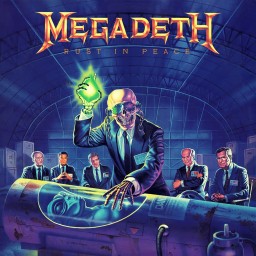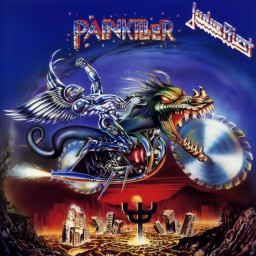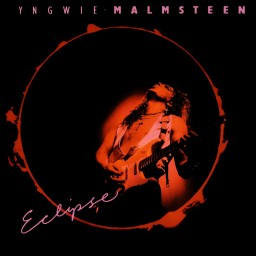SilentScream213's Reviews
This underground French Speed Metal band really shocked me here. Cites Interdites is a fantastic combo of aggressive Speed Metal, melodic Heavy Metal and a huge emphasis on soaring, dual guitar leads and solos.
I have to say outright, the solos on this album are some of the best I’ve ever heard, and the amazing thing is every song features at least one insanely good and memorable solo without any of them feeling like they’re treading the same ground. I’m actually reminded of Japanese band Anthem, who have a knack for writing (in my opinion) the best guitar solos in metal. This French band has a very melodic style quite reminiscent of Japanese Metal, but a unique aggressive edge to it, most prominent in the vocals and drumming.
The drumming is really insane here, and I actually thought it might be a drum machine because it’s so precise. Not that it’s blowing Tech Death away or anything, but there’s a nice depth and fluidity that accompany the usual machinegunning speed. The bass is a bit buried, but if you’ve got good equipment you can get a great taste of basswork going on underneath all those guitar leads.
One weakness here – a few songs have verses and choruses that aren’t so strong. No Man’s Land is an obvious offender here, having a very basic and dare I say boring structure with weak riffs and a poor chorus. However, it is definitely saved by an amazing guitar solo halfway through that goes on quite a while… all of the weaker songs share this trait. If you like guitar solos, there’s really not a track you can hate because they all have such amazing soloing thrown in somewhere. Unfortunately the B-side is slightly weaker which is a pet peeve for me, but the opening track (after the Intro) is about as flawless as Speed Metal gets.
Genres: Heavy Metal Speed Metal
Format: Album
Year: 1992
What is often hailed as one of if not the best W.A.S.P. albums is ironically more so a solo effort by bandleader Blackie that eventually got the W.A.S.P. label slapped on it so it could sell. Sometimes, an album can be a better package if it really is done entirely by one person. Especially in the case of a concept album.
Blackie had a story, he had a few main motifs and he rolled with it all the way through. The result is a strong album that feels heavily cohesive and has no moments of weakness. The music is very catchy, and adds just enough keys and other musical influences to up the “epic rocking” factor without truly dipping into cheese territory, and is actually quite serious musically. The album is surprisingly vulnerable for someone of Blackie’s reputation, as “desiring the love and acceptance of your parents” was not exactly a common theme in heavy music (though it was likely an undertone in a lot of the rebellious themes, no one would flat out admit it).
Aside from that, the story is another tale of a fictional rocker’s rise and fall, which had already been done to death by ’92. The album is consistently very strong, but if the main motifs aren’t working for you, it will get very samey and repetitive. Great listen to follow along the story, flows incredibly well, but the replay factor is quite low.
Genres: Heavy Metal
Format: Album
Year: 1992
Skyclad’s sophomore album is Folk Metal’s first, utilizing violins, acoustic guitars and medieval-esque riffs to create the unique feel of the genre. Skyclad’s debut was very Thrashy, but this one eschews most of that in favor of highly melodic, slower paced (comparatively) tracks. The vocals remain pretty gruff, however; nothing like the smooth flavor usually associated with these fantasy albums. My favorite tracks are where the faster ones where Thrash roots take stage, like “Salt on the Earth.”
This thing really relies mostly on the gimmick of the violin mirroring the lead guitar in every track. Not that it’s a bad thing; at the time it was pretty much the only band to do this. It definitely creates a more epic, fantasy filled atmosphere than their prior album. Uniqueness aside, I myself prefer the more straightforward Thrash of the debut. Even though most tracks are fantastic quality, there is a liberal use of interludes and weaker tracks in between. Still, this is definitely a must hear for anyone interested in Folk Metal. Respect is always given to the creators.
Genres: Folk Metal Heavy Metal
Format: Album
Year: 1992
An interesting release if nothing else. Starkweather’s debut seems to be labeled Metalcore mostly because it just doesn’t fit anywhere else, and in fact the album sounds like the band really had no idea what they were going for. It’s not bad, and definitely has an interest factor to it, but sounds unabashedly like an amateur band finding themselves.
The musicianship is very simple, and most of the time simple chords backed by basic beats carry the screaming vocalist in an anxious, occasionally depressive or angry atmosphere. The songs are way too long for what they have to offer. There are a few changes here and there, and the album is definitely hard to pin down. There’s Alt Metal, Heavy Metal, Trad Doom, Sludge, maybe even some Post-Punk in places, straight up Hardcore… and for lack of a better term we go with Metalcore.
I feel like these guys have a lot of potential, they just don’t find it here. However, it’s still a decent album with an interesting and unique palette to offer. Bonus track "Above the Rafters" is awesome.
Genres: Metalcore
Format: Album
Year: 1992
One of the reasons I don’t like Trad Doom is because it is not inherently dark and melancholic like the rest of Doom. It’s not carried by gloomy atmospheres but rather slow riffage that sounds more akin to lethargic Heavy Metal. For me personally, if I’m gonna be listening to repetitive and lethargic music, it absolutely has to be emotionally or atmospherically evocative. In those instances, the plodding tempo works wonders to elevate the foreboding sense of despair or tragic melancholy. Otherwise, slow, lethargic music to me is just boring.
Sleep’s style of “Stoner Doom” is everything I dislike about Trad Doom multiplied and expanded upon. Slow, groovy, repetitive riffs that do nothing and go nowhere. No atmosphere, no emotion, the riffs even sound “happy” a good portion of the time. I don’t hate happy music (my J-Pop ratings can attest to that) but as far as slow, heavy music goes, happy is the last thing I want to hear. There is absolutely nothing “Doom” about this record, it’s just slow. Sections of improvisation are common, though they never stray from the formulaic riffs. The guitar solos in these sections are usually very poor as well.
The lyrics are almost interesting. A line or two will paint an intriguing picture of some fantasy desert land… but then it trails off into something completely unrelated, probably trying to evoke hallucinatory drug experiences. It ruins any sort of worldbuilding or narrative I think they could have otherwise succeeded in.
I’m going to throw out a wild claim, but I think if some people stopped listening to these sorts of albums while on drugs, they might realize how mundane they are without… outside influence. Not to say people can’t enjoy the grooviness of this sort of thing in total earnest, but I do believe it’s probably overrated due to that sort of influence.
Genres: Doom Metal Stoner Metal
Format: Album
Year: 1992
Yes! Finally! A band takes the potential of Grindcore and uses it right!
Brutal Truth’s debut is full of extreme high-energy tracks stock full of insane riffage! There is a huge Death/Thrash influence to this thing, and the riffs are super evil sounding despite the wholly political nature of the album. And thank goodness, for once a Grindcore vocalist enunciates, those politically charged lyrics are easy to follow. The vocals aren’t really special in themselves but they get credit for doing what 95% of Grindcore can’t by being god damn intelligible.
The real sauce here is the musicianship, and holy hell these guys can play. I mentioned the riffage earlier, and it is air-tight. Guitar and bass shred along at insane speeds, ripping off the best riffs I’ve heard in the genre yet. The drumming is inhuman, the blast-beats are probably the fastest I’ve heard yet, and actually manage to be on-time (if not incredibly precise). However, the drums are usually not so much sonic aggression as to drown out the tasty riffs, and the guy knows when to play extreme and when to serve the music. Huge plus!
Incredibly awesome Deathgrind and my personal favorite Grindcore album as of its release.
Genres: Death Metal Grindcore
Format: Album
Year: 1992
The legendary Vulgar Display of Power. The TRUE original tough guy metal album, and the bottom line set for all of Groove Metal. Does it live up to the hype? Well, yes and no.
Vulgar Display of Power is actually one of the first metal albums I’d heard, thanks directly to three of its songs inspiring music in Doom. Back then, Phil’s harsh vocals bulging with testosterone were too tough for middle school me. I couldn’t handle the masculine aggression in that creature, but the riffs were awesome enough to get me to stay until my ears were able to withstand the full-on assault of his drug infused gorilla arms. The music was practically seeping with bull semen and stale alcohol, the guitar tone a disgusting buzzsaw drawl, and the drums hitting like concrete. The cover represents the music well.
The album jumps between aggressive Thrash beats and sharp riffs to plodding, sludgy groove sections; this pretty much set the standard for Groove Metal to follow as Thrash’s slower brother. For me, the Thrash bits are the best part. Songs like “Rise” are perfect example of unrelenting aggression. The pure Groove tracks like “Walk” do very little for me, and it’s that aspect of the album that makes it weaker than Cowboys from Hell to me. However, slower numbers “This Love” and the devastating “Hollow” are super unique and very well-done examples of Pantera’s slower side.
So why do I say “yes and no” as to whether this album lives up to the hype? Well, because across the span of many websites and circles, Vulgar Display of Power is actually not rated insanely high, usually sitting around the “great album, but no masterpiece” numbers. And that’s exactly what it is, simply an unprecedented, flawed, off-center punch in the face like no other. It is unabashedly itself; no masterpiece, but a very vulgar display of power that you can’t look away from, and will certainly never forget.
Genres: Groove Metal
Format: Album
Year: 1992
Another one of those “did it first” albums that in my opinion doesn’t live up to the hype its legacy implies. Aside from Anthrax’s “I’m the Man” and a couple Faith No More songs (if we’re being generous), there really wasn’t much Rap Metal prior to RATM, and certainly not a full album of it. The band certainly took a unique approach and recreated Hip-Hop using entirely real Rock instrumentation and original music, even using some guitar effects to mimic sound effects you might hear in traditional Hip Hop. It’s innovative, but a lot of those “guitar sound effects” end up sounding really annoying, like the siren whine on “Fistful of Steel” or the bass drops on “Township Rebellion.”
Zack sounds angry, and his delivery is good, but man some of the lyrics are weak. Oftentimes he’ll repeat a phrase over and over, and the chorus to the first song gives you a sense of that, where he just says “burn, burn, yes you’re gonna burn” a whopping 8 times. The guitars and the drums suffer the same problem. Sometimes Tom comes up with a decent riff, but after hearing it repeated 16 times over a very boring, monotonous drumbeat, I’m sick of it. The riffs don’t match Zack’s mood, either; they’re far more groovy than angry, and the slow, simple drumming gives no sense of urgency or energy to what /should/ be an angry, energetic album. The music sounds like something to chill out to, not exactly what you want for a revolution. The songs are also way longer than necessary, none under 4 minutes and repeating the same simple ideas over and over again. They’d be much better in short chunks, but they wear themselves out before they’re over.
One huge plus to this album is the bass. Timmy does a phenomenal job with his rhythmic groove, doing way more than backing the band and adding super spicy melodies to the mix. This is the one instrument I didn’t find repetitive at all; he’s definitely got a “lead bassist” thing going on.
Overall, not a bad album at all, but one of the most overrated in my opinion. Rap Metal is a genre that might not have too much room to succeed, but I’d love to see later bands take it in a different direction.
Genres: Alternative Metal
Format: Album
Year: 1992
One of the more interesting Death Metal albums I’ve heard. Messiah actually have a knack for sounding quite different on each album, while still sounding very “them”, and that’s no different here. After coming off of the amazing “Choir of Horrors,” this album is a bit of a disappointment for anyone thirsting for more of those amazing aggressive riffs. I think that expectation hurts the perception of this one, and I’ll admit on first listen I was quite let down. However, this one’s a grower with some great depth.
Speaking to the musical “issues” first, this one is very rhythm focused. Gone are the multitude of sharp lead riffs from the prior album. The guitarwork here is almost all rhythm, with simple but speedy chords acting as a crushing weight to the atmosphere. There’s a subtle complexity to the rhythm, structures and songwriting that help fill the space left by less lead work. It’s a different approach than most Death Metal bands at the time, for sure.
Where does this thing really grab me? Well, it’s actually a concept album about mental illness, told through the stories of a few scenarios, and it’s very gripping and well done. The language itself is pretty dated at this point (and it was written by non-native English speakers) but it was a time where mental illness was still quite stigmatized and unknown, so there’s no blaming that. The topics and actual messages of these songs are phenomenal. Raped Bodies is my favorite, as it details the psychological impact of a parent’s addiction, spousal abuse and divorce on a child, followed by social alienation and eventually culminating in acting out in sexual violence. It’s incredibly accurate to how adverse child experiences effect someone, and with no real internet at this time, it’s clear they went out of their way to do actual literature research. It absolutely talks about mental illness in a dark and graphic way, but it also explores the flaws in society's thinking and perceptions of the mentally ill. The writing truly captivated me on this one.
Apparently, most people don’t listen to metal for the lyrics. I will just say, you may be missing out on more than you know…
Genres: Death Metal
Format: Album
Year: 1992
An interesting transition from their previous attempts at mainstream universal appeal, but an appropriate reinvention for a self-titled album. “Loudness” is, in my opinion, their best release since the legendary underground masterpiece “Disillusion.” This album returns to their riff and solo driven Heavy Metal of old, mostly forgoing catchy anthems in favor of more aggressive edge and musical substance.
There’s a great variety of midtempo groove and speedy aggression. The plodding “Love Kills” has a riff heavier than concrete, and album closer “Firestorm” is easily the fastest thing they’ve ever done. The flow of the album usually has faster numbers complimenting the slower ones and works very well.
The lineup changes here have to be addressed because they bring some great changes. Filling in for bass is Taiji – THE Taiji – of X Japan fame, and yeah, it’s noticeable. As long as you’ve got decent listening equipment, you can hear that bass throwing out groovy melodies the whole time, and it’s wonderful. New vocalist Masaki Yamada has what may be considered an “acquired taste” vocal style, which is an aggressive, strained, and accented style. However, it fits the more aggressive musical style here, and he is very good at English, not only speaking, but writing. The lyrics to this one are far darker than anything Loudness have done before, and very well written, with some interesting topics such as the cruelty of animal testing on “Slaughter House.”
Possibly their best album yet, a real recapturing of their Japanese identity after their mixed attempts to sounds western.
Genres: Heavy Metal
Format: Album
Year: 1992
A lot of really good ideas and unique aspects to this album that were groundbreaking at the time. Probably most later Industrial Metal bands used this thing as a blueprint. The speedy, riff-focused parts of this are great, like Tv 2 and Hero, which rip along at chainsaw shredding speed. Al usually sounds good, which a very gruff yet nasally yell that is no doubt processed with some distortion.
What really ruins this album for me is the insane repetitiveness, especially in the annoying samples. Most of the songs here have parts where some vocal sample is repeated about 16 times, and it’s abundant with random shout or spoken samples that are thrown in at the rate of a snare drum. On the same note, even when the guitar riffs and rhythm section are good, it quickly goes stale after the same measure has been repeated about 32 times. There’s very little variety to each track, making each one more or less based around one repetitive section.
The title track is an example that almost uses samples well, specifically the choir vocals that add an epic touch to it, but then the rest of the track falls into the same habit of throwing in voices and what not so much that it just becomes annoying. Despite the abundance of interesting and unique ideas here, it’s something I have no desire to revisit because of how annoying it can be.
Genres: Industrial Metal
Format: Album
Year: 1992
It grooves, it jams, and it sounds like the dudes are having a lot of fun. Tracks bounce back and forth between halfway energetic rockers to total lethargic chill tunes, probably dependent on whether the band members were drunk or high at the time. The songs kinda do their thing for anywhere between 1 and 7 minutes, and eventually the whole thing is over.
For me, quite boring. Riffs and vocals are generic, and rhythm section may as well not be there, just doing the basic minimum to back the tracks most of the time. There’s no mood or passion to it, they just jam in a rather repetitive way until they get bored and start a new track. The more conventional songs are just a step away from Grunge, which isn’t a good thing to my ears.
I can see people enjoying this the same way one would rock out to some butt rock, but unfortunately I’m not one of those people.
Genres: Non-Metal
Format: Album
Year: 1992
It’s not really Drone Metal, it’s more like Sludge Metal and Drone for the most part kept separate. Anyway, aside from adding 10 minute feedback sections to their album, it sounds like what Melvins have been doing for a while now; monotonous, generic Sludge Metal. I will say there are times where the guitars die down and the bass provides some nice undertones, but most of it is quite boring. The 10 minute drone section is also entirely a chore, with nothing interesting going on at any time.
Melvins continue to make abrasive, experimental albums that are simply not for me.
Genres: Drone Metal Sludge Metal
Format: Album
Year: 1992
An interesting development in the discography of the mad maniac John Zorn. While the previous Naked City albums were pure Avant-Garde Jazz and Grindcore, this one has a healthy dose of Classical and Ambient sensibilities. Of course, these are all created with the same ensemble of instruments as far as I can tell, so it’s usually a dissonant hum, but certainly interesting to hear this group cover composers such as Debussy.
The rest is classic Naked City, and I’m not sure giving this the Avant-Garde Metal title is truly deserved. It’s a bizarre affair, that’s for sure, but as most tracks are short, different elements are usually kept separate as opposed to woven together, making this a very eclectic collection of songs rather than a unique genre that ties them all together.
If you like John Zorn’s mad rambling music, you’ll surely like this. If not, you might appreciate some of the Classical stuff, so it’s worth a shot.
Genres: Grindcore
Format: Album
Year: 1992
I can’t tell if this is a transitional album yet cause I haven’t heard anything they released after, but on Somewhere Far Beyond, Blind Guardian really start to lean into more modern sounding cheesy melodic Power Metal. They’ve still got their thrashy Speed Metal edge, but a much larger focus is put on keyboards/synths and the general epic atmosphere. There’s also quite a variety of styles present, even in individual songs.
Most of the tracks here are magnificent; catchy yet fierce, energetic yet anthemic. I really like the vocals too, having a rough edge of aggression most of the time, but easily hitting smooth melodic notes when he needs to. Guitars, bass, drums, keys; all splendid, adding great flavor to the mix.
My huge complaint with this album is the amount of useless filler. Out of the ten tracks, two are pointless interludes that add nothing to the album, and the first Bard Song is an acoustic song that just isn’t up to par. Acoustic ballads can be beautiful, but this one is missing that special something and just ends up breaking the flow of the album. The bonus tracks, which are actually usually included in main releases, are great tracks that definitely add to the album in my opinion.
Unfortunately not as consistent as previous releases, but many of the tracks here are absolute top-notch Power Metal.
Genres: Power Metal
Format: Album
Year: 1992
With the turn of the 90’s, guitar-hero-lead Neoclassical Metal was one of the many Metal styles to see a sharp decline in both quantity and quality. Impellitteri’s sophomore album “Grin and Bear It” is unfortunately not an exception, but rather a testament to that fact.
Grin and Bear It manages to be the top Neoclassical Metal album of the year by this fact alone. While Impellitteri’s debut not only had very memorable guitar leads, it also was commanded by the legendary Graham Bonnet on vocals. New vocalist Rob Rock does a good job and even has a similar sound to Bonnet, but he can’t match the man when it comes to crafting earworm hooks and interesting lyricism. Impellitteri himself is still putting out impressive solos and riffs, but similarly, they just aren’t very memorable. There’s also a lot less “power” on this one compared to the debut, and it sounds more in line to hit some commercial success (though I’m sure it never did).
One plus is that the production is much better than the debut, which was a mess for no good reason. None of the songs are bad by any means either, it’s just nothing to write home about. The track “Power of Love” is an easy cut above the rest, with some classic Power Metal sensibilities to it.
Genres: Heavy Metal Neoclassical Metal
Format: Album
Year: 1992
Though a legendary album now, Darkthrone’s A Blaze in the Northern Sky would have been a total shock to anyone previously following the band. Their debut was straight Death Metal, and though it did have a focus on melodies and cold atmospheres, other than that it had very little in common with this creature. I can only guess they started listening to Bathory and decided to go that route, cause I hear Bathory influence all over this. The biggest difference is instead of epic Vikings, the theme is Pagan winters.
A Blaze in the Northern Sky is just 6 long tracks filled with very competent Black Metal, consistent in quality from start to finish, and without many surprises. This is probably considered a landmark release in 2nd wave Black Metal due to its melodic tendencies and lyrical themes that steer away from Satanism. Interestingly, the production sounds a bit worse than their first album, maybe done intentionally to capture that authentic Black Metal sound. My favorite aspect here is the drumming, which is incredibly varied and has much more precision than most Black Metal at the time. The drummer knows when to drop into Doom territory and when to go all out, and does it all very well.
For me, I’ll say that while it is a great album, it didn’t live up to its hype. There’s nothing incredibly unique about it, and to me it’s just a Black Metal version of their debut – strong and competently played, but ultimately unmemorable. Definitely a great listen for that nocturnal winter feel though.
Genres: Black Metal
Format: Album
Year: 1992
Jealousy has always been a hard album for me to rate. The dilemma starts with the fact that a lot of X Japan’s most mediocre material is on this album. That’s not to say any of it is bad – most is actually still great, considering this is X we’re talking about – but this album is not consistent.
I will disclose that nostalgia has rendered many of these more mediocre songs incredibly enjoyable for me now, but there’s no denying the weaknesses here. Desperate Angel and Joker are kind of odd rockers, kind of commercial but lacking any real hooks or staying power. There are 3 instrumentals here, the first track being a beautiful example, but the others are rather take or leave. And then there’s Voiceless Screaming, a beautiful acoustic track which is a very fine song, but most will probably find it about 3 minutes too long.
There’s about half an album left now…
Miscast is an all-around solid track with some fantastic riffs and solos. It’s not their most unique song, but it’s just really good for what it is; a hard rocking melodic riff fest. Stab Me in the Back, on the other hand, is some much-needed energy and aggression for the album. Apparently written years earlier, this track is straight up Thrash Metal, up there with Orgasm as their heaviest and fastest material yet. For fans of their earliest work, this song is a highlight.
So what could possibly hold this all together and warrant such high marks?
Bookending Jealousy are not just the best songs on the album, but (for me at least) among the greatest songs ever written, bar none. Silent Jealousy is one of the earliest (and still most well-done) marriages of actual classical string composition and fast, aggressive metal. Silent Jealousy somehow manages to sound like both a ballad and a thrashing speed metal masterpiece. It is quite simply one of the most powerful displays of sorrow there ever has been, as the track laments about Jealousy, yes, but more specifically what seems like unrequited love. Every musician plays along at lightning speed, breaking their back for over 6 minutes straight, yet the entire song carries a tone of melancholic beauty. This is true catharsis, the exorcising of pain through sweat and art, finally turning it into beauty.
The first time I listened to this album way back when, I remember hoping the closer would be some energetic thrasher or something because the album had been so slow. Beautiful, but slow, and lacking the edge of their previous albums. Well, I didn’t get what I wanted, because Say Anything is an 8 minute ballad finishing off with that theme of unrequited love. Even now, I struggle to find the words for this song. X Japan have written many ballads, almost all of them being top class, heart-rending beauty that plays off that Japanese cheese so well. This one is my favorite of them all, and I could never do justice to it trying to explain the eloquence of the actual compositions. What I can say, is that it captures this feeling of “unrequited love” better than any other song, better than any attempted explanation of the phenomenon in any medium I’ve yet found. Elegant, lovely, fragile, vulnerable, painful. The song is a masterpiece on its own, but for anyone who has experienced this feeling, it is a flawless embodiment of one of the most painful experiences a human can go through.
Closing statement:
“I believed if time passes,
everything turns into beauty
If the rains stops, tears clean
the scars of memory away
Everything starts wearing fresh colors
Every sound begins playing a heartfelt melody
Jealousy embellishes a page of the epic
Desire is embraced in a dream
But my mind is still in chaos
and...”
Genres: Heavy Metal Power Metal
Format: Album
Year: 1991
One of those albums where everything just feels off… except after repeated listens, I have determined this to be quite intentional, and done in the best way.
You see, Voivod get bored easily, and they had already been down many musical avenues, and pushed the limits of music (and their own abilities) multiple times. On Killing Technology, they showcased the extent of how fast, aggressive, and technical they could play. On the following Dimension Hatross and Nothingface, they were at the forefront of slightly avant-garde Progressive Metal, making albums quite bizarre in musical structure, showcasing complex songwriting ability. And now we have Angel Rat, which at first listen just sounds like them giving up on trying to prove anything anymore. Only faint glimpses of their progressive technicality remain on what is almost a poppy, Post-Punk inspired Alternative Metal album.
I was disappointed at first, as I think anyone would be. But something about the album kept me coming back, and I realized something. Voivod have transcended using technical speed or complex songwriting. They are taking the term “progressive” to a new frontier here, and focusing on creating very complex, ever changing MOODS. If you can imagine a mood having an odd time signature, this is absolutely it. Every song here, despite having relatively simple instrumentation and structure, jumps between some of the most schizophrenic, bipolar moods I’ve ever heard, all without janky start-stop instrumental tricks. The songs flow as smoothly as pop songs, and although the instrumentation can actually be quite intense and complex at times, you wouldn’t really know it without focused listening.
They place the most normal tracks at the beginning. As long as you weren’t listening to the lyrics (which are beyond strange) you could convince yourself that the first 5 tracks were all normal, though they just don’t sound right for some reason… And were those double bass Thrash beats playing under the chorus at the end of Clouds in My House? That’s right, this IS a metal album after all, and don’t forget it!
Track 6, Twin Dummy, is where you could no longer convince yourself this album is normal. The way Snake anxiously yells “The circus left without me!” and then sinisterly muses “And I’m alone with you now…” is unnerving to say the least, especially surrounded with off-kilter lyricism about carousels, dummies, and whatnot. From here on out it becomes more obvious that there is something wrong with this album.
The title track, Angel Rat, capitalizes this best. The opening line “The idiot walks along the canvas…” as Snake then paints a dark and unnerving picture much like the album cover. Gloomy, ominous chords and soft spoken vocals shake through this hideous landscape of darkness and hopelessness… and then a sugary sweet, smooth chorus kicks in about how nice flying away would be. At first this chorus kind of ruined the song for me, but after sitting with it, I totally get it. The figure in the song is an idiot precisely because they still have this innocent, childlike hope of flying away from this horrid picture. Yet they are painted into the canvas just as everything else is. They are stuck there for eternity. The question “rat or angel, does one really know?” is such an interesting comparison. They aren’t comparing good or evil. They’re comparing something significant, powerful, and bright, with a wholly insignificant pest (that cannot fly, mind you). The song is a masterpiece in cryptic writing and mood distortion, and the rest of the album walks the same line.
There are a couple other factors that make this album work so well. For one, I’ve always maintained that Snake’s yells are much better than his singing, and that was a big reason why Voivod’s duo of Prog albums weren’t as great for me. But here, Snake’s vocals are perfect. Not that he’s improved much, no… rather, his shaky, strained voice works wonders for the kind of atmosphere they’re going for here. He’s got an anxious tone to his voice that shines through even during the poppy choruses, and this makes them catchy but never anthemic. Even when he sings smoothly, like in Clouds in My House or Angel Rat, it just doesn’t sound right, and that is precisely why this album succeeds in such simple verse chorus format. The drumming is another fantastic element here. Usually it’s pretty simple, but never boring, and best of all, more than occasionally it just breaks out into full on double bass metal beats. However, the drumming is pushed low in the mix so that it never overpowers the music, and it really serves as another backbone of hidden elements you wouldn’t appreciate unless you listened intently for it. Layered guitar melodies, vocal harmonies and atmospheric soundscape textures work the same, hidden at first listen but uncovered after due attention.
This album is a massive grower and has so much to offer to those willing to delve into the depths of its dark, demented canvas. Voivod have successfully taken progressive music to a new level!
Genres: Progressive Metal
Format: Album
Year: 1991
Blows my mind that Ray Alder isn’t considered one of the canon greats of metal vocalists. The music here is technical and complex Prog Metal, but the vocals are total AOR a la Queensryche. Ray’s range is very impressive, he can hit incredibly high registers without getting pitchy or strained, and carry a passionate weight all the while. The way he harmonizes with himself are flawless, and again making comparisons to Queensryche, the choruses on this thing are catchier than the vast majority of Pop music. The lyrics aren’t shallow by a longshot, but pretty clearly revolve around feelings of lost human connection, letting go, and moving on. Or in Pop terms, breakup songs.
Probably an odd way to praise a Prog Metal album by immediately comparing it to Pop music and focusing on the vocals, but whatever. The songwriting is quite similar to the prior Perfect Symmetry, but it’s a bit simpler in structure and with better production. There was an obvious emphasis on melody and catchiness when writing this one. Fates Warning certainly tread the softer side of the genre, but unlike Queensryche, the musicianship is very technical indeed, and simple choruses where the vocals can shine often give way to incredibly intricate verses and instrumental segments. Though most of the album is the simple Rock ensemble of instruments, layering and production effects ensure a depth to the sound that reveals more with each listen.
While every song here is fantastic, I will admit the ending tracks are weaker, except for “We Only Say Goodbye” which is a Pop Prog masterpiece. Probably my favorite song by the band by this point, the lyricism and emotion in Alder’s voice play over simple yet evocative guitar lines that pull every heart string. Such a beautifully passionate song that is sad yet strong. Like much of this album, really. Despite how catchy and melodic it is, “Parallels” is a truly somber package, best enjoyed when you are reeling from loss but still want to sing along to some good music.
Genres: Progressive Metal
Format: Album
Year: 1991
As far as I’m concerned, this is Sepultura’s magnum opus. They still had the energy, aggression, and razor-sharp riffs, and here it met with fully competent musicianship and perfect production.
The album opens with what is probably Sepultura’s best song to date, with that unmistakably intense lick that sounds like it’s about to shred the strings right off the guitar. In an interesting move, Sepultura start and finish the album with the two fastest and shortest songs on it. Some of the tracks in between are much longer and quite a few almost delve into Groove Metal territory, hinting at their future. However, there is never a lack of riffs, and the rhythm section especially keeps the energy high and the pace interesting even when things slow down.
Sepultura kind of lost me after this album. Most people love Chaos A.D., but for me they lost their magic when they slowed down. This record and all preceding it are just so angry, so effectively evoking that manic rage. After they slowed down, they stopped conveying their core emotion so well. You can hear the rage in these riffs… that’s what is important. The music has feeling. Here, that feeling finally culminates into the album they’ve been trying to write for years, and it’s a masterpiece.
Genres: Thrash Metal
Format: Album
Year: 1991
Master’s Hammer’s debut is a surprisingly melodic package of classic Black Metal material. Somewhat similar to Bathory’s transitioning stages as they add elements of “epic” sound with synthed choirs, but always stay strictly in first wave Black Metal territory. The band really lean into simple melodic leads, and they work the hell out of it. Every track has got some really memorable riffs despite them being quite simple and containing just a few notes. The drumming is actually a few levels above the other instruments, containing a nice variety of groovy Heavy Metal beats and classic Black Metal blast beating.
The band had plenty of time to perfect their craft with multiple demos and EPs, but this is still technically a debut, and a great one at that. Ritual isn’t the most unique album in the scene, but everything about it is executed extremely well, and the album is a fun, epic, evil ride. Not mind-blowing, but there are really no weaknesses to this thing, a classic example of melodic first wave Black Metal.
Genres: Black Metal
Format: Album
Year: 1991
Savatage’s first attempt at a full on Rock Opera is mostly successful. The sound mostly picks up right from the more operatic parts of Gutter Ballet. They turn up the cheese, usually working well with it as they always have. The highs here are magical; Tonight He Grins Again is one of their finest songs ever, and Believe is a great ballad and closer.
The issue here is the same as many other overlong concept albums. At 16 tracks and almost 70 minutes, there is a lot of filler. The first half particularly struggles to deliver as many of the songs are kind of just fun rockers, which is not Savatage’s niche (The only ballad on this half, A Little Too Far, is their worst ever). The second half leans more into the melodic balladry they’re so good at, picking up a nice melancholic tone that brings it home nicely. The lyrics are good, but the story itself really isn’t all that compelling, as it’s just a rock star who got fame, hit rock bottom, got back to rocking… We’ve heard it a million times.
Overrated, especially compared to their other albums, but still holds many gems.
Genres: Heavy Metal
Format: Album
Year: 1991
Iced Earth’s sophomore album is where they aced their style of epic, thrashy Power Metal. The album is a concept about a man fed up with religion who receives power from the devil and leads a sort of crusade against humanity, plunging the world into darkness, before finally losing his mortal soul to the devil after all is done. It’s a well written story with a decent variety of songs that back up each chapter. None of the musicianship or songwriting is mind-blowing, but it’s certainly very strong, and the rhythm section puts down some quite unique (for the time) beats.
I feel I should enjoy this album more than I do, but despite the awesome concept and genre being right up my ally, it just doesn’t strike home. The riffs are very rhythmic and unmemorable, somehow they are missing both the edge of Thrash as well as the melody of Power Metal. That aside it is very great stuff, a strong concept album played in a style unique at the time.
Genres: Power Metal
Format: Album
Year: 1991
One of those revered albums that I just don’t get. Soundgarden has been on the forefront of both the Grunge and Alt Metal movements, and consistently sprinkle in Stoner Metal influence to give themselves a groovy, but occasionally lethargic sound. Badmotorfinger is really where they get their act together, but despite playing in a still fresh genre, Soundgarden already have real trouble standing out.
The fact is, there isn’t anything in this album that grabs me. The riffs aren’t catchy nor are they sharp, just kind of groovy but without soul. The rhythm section is lethargic most of the time, and the vocals are classic yarl vocals that I personally don’t like at all. They don’t really go all out in any direction, sometimes it’s kind of anxious, sometimes it’s more chill, but it’s never doing anything stronger or better than contemporaries. The lyrics are just kind of there, and there aren’t any anthemic or memorable hooks. No memorable anything really.
It’s fine for what it is. I’m not a big fan of Grunge or Stoner so I’ve got my biases. I don’t dislike it at all, just don’t find anything in it worthy of the acclaim it gets.
Genres: Alternative Metal
Format: Album
Year: 1991
Gothic is pretty much where Gothic Metal got it’s name and signature sound, especially the title track. Of course, the majority of this album isn’t actually Gothic Metal – rather straightforward Death Doom is the name of the game here. They add some female vocals and melodic lines every so often, but otherwise this is pretty stripped down and basic.
My favorite part of this album are actually Nick’s vocals. Those are some monstrous howls right there, and the heavy reverb ensure they create a great atmosphere on their own. I appreciate this one a lot more than when I first heard it, but I still see it as an overrated stepping stone simply leading the way to truly great Death Doom and Gothic Metal that other bands would perfect.
Genres: Doom Metal
Format: Album
Year: 1991
One of the first Metalcore bands, and perhaps the first to receive some real success, Integrity take a pretty standard Hardcore Punk approach and add some mean Crossover Thrash riffs and all around Metalcore heaviness. The vocals are transitioning from punk yells to the growls that inhabit metal. Lyrical themes are dark and the mood is a straightforward, angry bundle of energy.
The album is pretty damn simple and consistent, and with 15 tracks they all blend together by the end. Integrity do slow it down a fair bit which adds some variety, but for the most part every song sounds the same. No problem if you want some great Metalcore from the genre’s inception, but it's still a very primitive form of what the genre would become.
Genres: Metalcore
Format: Album
Year: 1991
Following their mostly pure Groove release of Beg Differ, Prong evolve yet again into a rather different creature. On Prove You Wrong, the Alternative Metal elements are brought to the forefront, and some of it runs parallel to the budding Grunge/Alt Rock movement of the time. However, there’s also a large dose of Industrial Metal and Hardcore Punk, sometimes all in the same song. Prove You Wrong is a mishmash of a lot of genres, most of which were still quite young at the time, and they are pulled off well enough.
As far as the quality of the music, it’s mostly good stuff, though nothing really jumps out as being amazing or anything. There’s a nice variety in sound and style to keep things interesting, but a lack of any great riffs or catchy hooks. Probably more just for hard fans of the genre.
Genres: Alternative Metal Groove Metal
Format: Album
Year: 1991
Old took a huge leap on this one. Their debut album was a generic Grindcore album that attempted and mostly failed at being edgy and humorous. This is… an Avant-Garde Industrial Metal album with hints of Grindcore, Progressive Metal, and general insanity…
This album is not only much weirder and more unique, but just generally much better. The playing is solid, songwriting is interesting and varied, and the production is much stronger. A great example of a joke band getting serious and making something both interesting and awesome. This thing is filled with manic energy and mutated dystopian future vibes, all done very well. Not always my cup of tea, but always at least preformed with strong execution.
Genres: Avant-Garde Metal Industrial Metal
Format: Album
Year: 1991
Kyuss’ debut album is an incredibly generic affair even though it helps set the stage for a new genre of metal. They aren’t really doing anything super unique though, just making the already existent Stoner Rock a bit heavier. Some of the songs have some really fun, groovy riffs and rhythms, namely the first two tracks and the beginning of “The Law.” Unfortunately, “the Law” is a nearly 8-minute track that cannot hold that momentum for even a fraction of it’s runtime.
Therein lies a huge problem here; though it has its moments, every song is overlong and repetitive, and for some reason, usually repeating boring chords as opposed to the riffs that are actually good. The songwriting is very standard, the lyrics suck, and the vocals are annoying. Even if you like “fun” metal, I don’t see this doing too much. Not bad by any means, but not to my taste.
Genres: Stoner Metal
Format: Album
Year: 1991
Basically a worse and more disgusting version of Primus. They get props in that they sounded totally unique, perhaps even to this day. Even for Avant-Garde metal, this is really weird stuff. Not that this came out of nowhere – the band had been putting together demos and EPs of Avant-Garde Funk Metal for a few years, making them unequivocally pioneers of this style of music.
The thing about this album is that every aspect of it – from the vocals, to the lyrics and humor, to the disjointed, eclectic songwriting and sound – are all acquired tastes. Very strong flavors that you either love or hate. For fans of the bizarre and “out there,” this is quite frankly a treasure trove of unique ideas and execution. For me, it’s just a lot of things that I don’t enjoy meshed together into a long, messy record.
Genres: Alternative Metal Avant-Garde Metal
Format: Album
Year: 1991
Death continue pushing towards increasingly technical music here, and interestingly retain the more melodic style of riffs and leads found on Spiritual Healing. From the first song “Flattening of emotions,” we get some riffs that sound less like “hell infernal evil” and more like “humanity is suffering.” There’s real depth here, and daresay mood and emotion as well. I do believe Death was responsible for influencing melodeath on this and their previous album, which is why I prefer them to the straight OSDM “Leprosy.”
Schuldiner’s lyrics and vocals reach a more mature point, and his guitar playing is top class. The rest of the band, especially drummer Sean Reinert, really impress in managing to stand out next to Schuldiner here. The instrumental track is pretty weak in comparison to the rest, but the album still manages to be a masterpiece easily run through front to back. So many amazing riffs that are carried by a great depth in both the songwriting and themes.
Genres: Death Metal
Format: Album
Year: 1991
That opening title track instantly takes you to the very dark yet epic world of Viking Metal, as crafted by underground metal gods Bathory. Strained, raspy vocals are in full choir support, and a slow and steady pace takes you into the martial atmosphere of the now abandoned gods. Riffs take a backseat to sustained power chords and rather melodic solos, as the atmosphere is integral here. Acoustic passages abound, capturing a folky feel throughout. It’s a truly epic monster of a track.
The rest of the album does pretty much that, except not as well. It’s a pretty consistent affair of long tracks, most being pretty slow and simple, all good for an awesome trip into the Viking’s realm. Personally, I still miss the speed and aggression of the pre-Hammerheart days, and the monotonous tempo gets tiring to me. Regardless, a very fine piece of work.
Genres: Viking Metal
Format: Album
Year: 1991
As far as pushing progressive themes like technicality, odd-time signatures, and intensely difficult musicianship, Atheist pretty much took the crown when they dropped Unquestionable Presence. They took elements from Watchtower in general and Death’s most technical moments and shot it all up to 11. Every song is one of those multi-movement marvels where so much is going on and it changes so often that your mind is constantly struggling to grasp it. People say there’s a Jazz influence here – maybe, but I don’t think that was intentional. Atheist never stray into chaotic or improvisation territory, as everything is so exact it’s almost the antithesis to Jazz.
The mind-boggling music of the album does have a weakness though. Personally, I prefer Atheist’s debut, Piece of Time, for one simple reason; it was riff-focused. It still had a ton of extremely technical work, but first and foremost they had awesome and memorable riffs. Unquestionable Presence, for all it’s power and might, fails to grab me with any significant moments. Over 20 listens on and I still couldn’t tell you one song from another. At least this complexity assures the album will always be enjoyable front to back, never in danger of burning itself out.
Genres: Death Metal Progressive Metal
Format: Album
Year: 1991
Good god. Death Metal was born in the late 80’s, but most of that stuff isn’t a huge leap away from extreme Thrash and Black metal of the same decade. Even the albums that had broken from carrying clear Thrash influence still sound like a genre in development. This beast sounds like it could have been released yesterday.
Entombed took one step back and two forward. They slowed down a bit, and instead of trying to outdo their peers with technical prowess or blistering intensity, dug themselves a grave and adopted a truly sepulchral sound. Insanely downtuned guitars with a sludgy buzz sound like they’re cutting through a murky swamp, while the rhythm section lays tight and varying beats that pound at a steady mid-tempo (by extreme metal standards). The vocals are the deepest growls laid to record by 1990, and there is a very cold, grave atmosphere that runs somewhat contrary to the genre’s roots in hellfire. The blue cover could play into this as much as the band’s icy homeland – but this is unmistakably the closest to true, cold death that Death Metal had ever gotten at the time
Genres: Death Metal
Format: Album
Year: 1990
Back in 1990, making a sullen, introspective USPM album was certainly new ground in itself. Sanctuary’s small dosages of technicality and prog along with a pinch of Thrash in both the vocal delivery and riffs further make this a standout release for the time. Indeed, you could certainly call this thinking man’s metal, with its more philosophical approach to the genre.
Underneath all that though, it’s not pretentious in the slightest. It’s just very competent USPM with some fantastic riffs and melodies, good vocal performance and lyrics, and always interesting rhythm section. It’s not exactly mind-blowing music, but everything comes together here quite perfectly, and it has a very fresh sound to it even now. Every track is top quality, not a minute of wasted space, what more could you want.
Genres: Power Metal
Format: Album
Year: 1990
Another one of the biggest shocks of the 90’s. Sleaze metal losers Pantera decide to reinvent themselves as some sort of cowboy metal saviors, become about 3 times as heavy and start cranking out sludgy mid-tempo riffs as if they’d been doing it all along. The drumming, despite being the same guy as always, takes on a much different flavor here, making way more use of double pedals, Thrash beats and occasionally some technical prowess as well. Phil’s vocals evolve from the generic Glam croon of the last album into some rancid, dehydrated desert monster hell bent on ripping your face off.
All in all it’s just one of those huge wtf transitions that somehow went from the worst aspects of machismo in music to the best. There is little substance here, but there’s some great fun and ass kicking music that was without peer in 1990.
Genres: Groove Metal
Format: Album
Year: 1990
Nothing Megadeth did in the 80’s really struck me as all that amazing (no, not even Peace Sells…) but Rust in Peace is almost as incredible as the legends tell.
Megadeth has long avoided my praise due half to Dave’s poor vocals and lyricism and half to the total absence of real feeling in the otherwise impressive playing. Here, the band improve their already strong technique to enter Tech Thrash territory at times, but much more importantly they add a heavy dose of intelligent and evocative melodies that serve the song instead of simply showcase talent. The first few tracks have earworm riffs for days, just galloping one after another, only stopping for equally fantastic solos.
Dave’s vocals aren’t good here, however, he has found the sweet spot in making them work with the music, and most of the time they work really well. Holy Wars is the best example, as he switches between angry snarling about government, to a rough, desperate croon that actually sounds pained when playing the role of The Punisher lamenting what he’s been through. His voice doesn’t always hit right, but here it works much better and more often than anything they’d done prior. The lyrics range from very good to not so great, but they almost always manage to be better than the shallow words of their 80’s output.
There’s so much energy and good technique that even the weaker songs on the album are quite good. However, it is certainly a glaring weakness that side A is so, so much better than side B. Once you get halfway through, you’ve very little to look forward to in comparison of the awe-inspiring material that starts you off. In terms of high points though, this album reaches heights that are absolutely deserving of its praise.
Genres: Thrash Metal
Format: Album
Year: 1990
Painkiller. I don’t think anyone saw this coming from Judas Priest, one of the tamer metal bands, some 20 years into their career. I can’t imagine the insanity this caused when it dropped in 1990.
I can only look at it now. And now even now, it remains an absolute beast of melodic Speed Metal with more than a few of the genre’s most memorable riffs ever put to record. Halford’s iconic voice becomes a shredding cry here on a much different level than he had ever done before. The drumming flows into Power Metal territory with its constant double bass pummeling, and the guitars weave intense melodies that flirt with Thrash but lean more towards epic stylings rather than dark. And yet, the music and vocals are very aggressive, but almost upliftingly so. Perhaps triumphantly is a better word, as this album is a remarkable triumph of metal and indisputably Judas Priest’s finest hour.
Genres: Heavy Metal
Format: Album
Year: 1990
Yngwie begins the new decade with his most mainstream release yet. It’s a pretty smooth transition from Odyssey – the AOR and simplicity turned up a bit. It starts off pretty dull, and a good portion of the tracks are unmemorable anthems. The lyrics are quite poor, though they’ve never been great.
It’s not all bad, though – Eclipse is the first album where Yngwie uses his guitar to start layering simple yet effective melodies in almost New Age style. They play off keys and vocal harmonies, and there are some moments where all the sound comes together in really nice ways. Vocalist Göran Edman actually steals most of the songs, as for once Yngwie doesn’t do a whole lot of shredding and soloing. I won’t lie, these songs are about as uninspired and passionless as radio pop, but Göran certainly doesn’t lack ability, and he’s got a few fantastic hooks here. The album also ends with a string of really strong material, meaning it leaves a poor first impression, but a much stronger lasting one. I liked it more with each listen.
Overall – some of his worst, but also some of my favorite material from Yngwie.
Genres: Heavy Metal Neoclassical Metal
Format: Album
Year: 1990










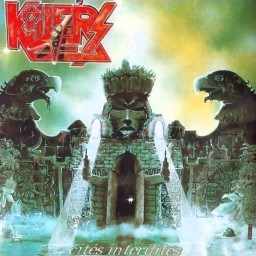
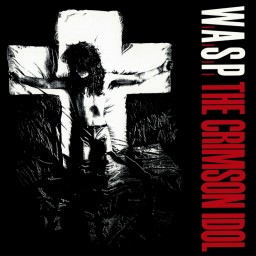
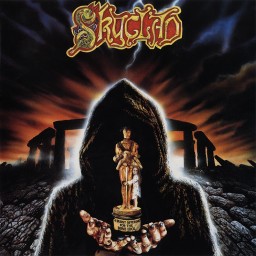
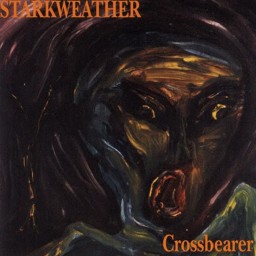
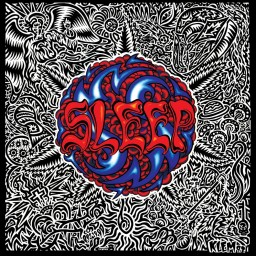
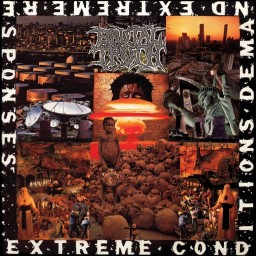
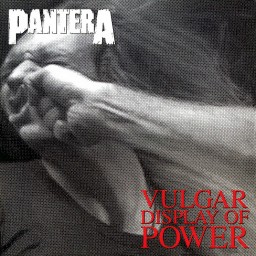
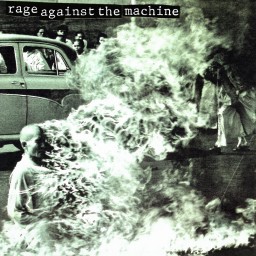
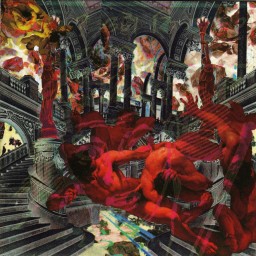
![ΚΕΦΑΛΗΞΘ [Psalm 69]](https://metal.academy/uploads/releases/2cb808be0c3e01143b51bd502863f324.jpg)
